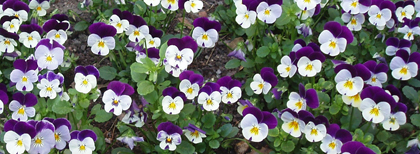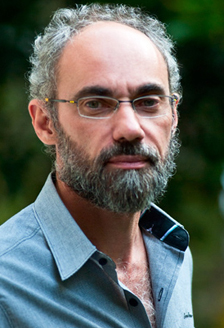Daughter
by João Anzanello CarrascozaThe skin,
touching your skin with the tip of my finger, drawing your outline, I remember that this natural skin covering us can only capture our sensations on the surface, on which thousands of radars are planted;
like roads, the skin is not depth but extension, tattooed dregs, the skin is not like the ocean, it has no margins, it borders are undefined – the ocean is more ocean below, where only deep-sea divers can reach, the deeper you go the more ocean there is; but not the skin; if we dive into the skin, Bia, we find what it is not: flesh and muscle and blood and bones – the skin is a flatland, and it is on this flatland that pain strikes, it is on this surface that the desire for another skin takes shape, it is on this thin cutaneous layer, even when it is neither soft nor elastic, that one reads the signs of the world, other people’s messages, the maximum alert of desire;
throbbing, this is my finger stroking the tip of your nose, one of your cheekbones, the curve of your chin, acknowledging, in this way, that you are my daughter, and will always be, the skin and the map that leads us, like a river carries a branch in its flow, towards sorrow and joy, bites and kisses, to Nirvana and Hades,
and even though you will not be able to feel my touch, or if you one day forget it, because now you are already drowning in the waters of the past, you, months (perhaps even years) from now, with closed eyes, as you are now, asleep in your cradle with me caressing your face, you will be able to say – your skin will remember it – this is my father.
…
Your skin will certainly recognise the touch of your mother too – today she is feeling better, she left her bed and had breakfast with me – and no one but she, when she conceived you, was able to touch you from the inside, unlike the rest of us, who will always touch you from the outside,
and in the future, when you become a woman and discover (your every pore will confirm it) that the skin is truly the core, like plants are plants and also the external heart of the earth,
a day will come in which, in contact with the unknown, you will not even need to touch skin with skin, a whiff from it will suffice, a single word, for you to say, with the certainty of the predestined – or the condemned – this is my man;
and then there will come a point at which your emotional education will be transformed, Bia, from then on the old sun that has shone since time immemorial will seem new to your eyes, the extinct tropical rose will spring suddenly from your hands, the noisy cogs of impossible dreams will once again move, the world of dead hopes will be resurrected;
after all, a single water drop is enough to make us long for rain, a sign of rain is enough for us to smell the wild scent of grass, one cannot avoid the treachery of days that will seem happy to you, and perhaps truly will be, just as, in moments to come, terrible days will be waiting serenely for you to go by, and they will jump on your back and remind you of the kingdoms of Chronos and Kairos, that there is a time for the hand to sow and a time for the scythe to reap, there is a time to see and a time to revisit (at the end of the trodden path), written by memory, the facts that will make the Bia of tomorrow,
there is a time for lush sap and a time when nature turns to pus,
and if a man can sleep salty from the sea and in the morning discover himself to be a cattle drover, and if another wakes up as an insect in the mind of a writer, and if from the fingers of a painter an Abaporu blossomed, and if on a movie screen appeared ants and an Andalusian dog, and if fields and branches and roses gave birth to imaginary territories, you can be sad in the morning, hopeful in the afternoon, and sunny at night, Bia,
you can dry your whole tongue in thirst, you can touch, not with thought, but with illogical feeling, that which vibrates between my words, and gather, like clothes on a line, the meanings that hang there, and also catch in all of them the history they begin to tell you; look,
your grandmother Helena placed you in a pram and brought you to the veranda, so you will get used to this place, where the stones of the path never tire, and the wind (from the beginning of the world) touches you for the first time, and things are what they are – things, independent of us,
here is a flame tree and the shadow it casts, here are the houses that continue down the road, and here is a boy (opening the gate) in whom a future man can already be seen, your brother Mateus, and that, what is that moving slowly on the pavement? just a few stray dogs,
but here is a flower bed where your mother grows love-in-idleness – in their petals, so beautiful and fragile, time is merciless –
and here is the closed window of the bedroom where she is recovering, her breasts bursting with milk, but without the power to feed you, and even if no one has taught you this language yet, Bia, a single sigh from her is enough for you to immediately recognise her and say, this is my mother.
Translated by Renato Rezende from the novel Cadernos de um ausente (Notebooks of a Missing Person), forthcoming from Cosac Naify in May 2014. Reproduced by kind permission of Mertin Witt Literarische Agentur and Agência Riff.
João Anzanello Carrascoza worked as an advertising copywriter for two decades before becoming a full-time writer. He has published over thirty books, including many award-winning short stories and novels for children and teenagers, and his work has been translated into English, French, Italian, Swedish and Spanish. Read more.
Renato Rezende was born in São Paulo in 1964 and studied at the University of Massachusetts, Boston, where he lived for almost ten years. He is a poet, writer and translator, mainly of poetry, philosophy, and contemporary art.



